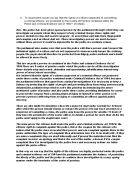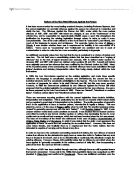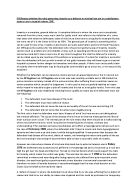The offence of burglary has been defined by parliament. However, it has been left to decisions of the courts to clarify most of the key ingredients of the offence.
Burglary ‘The offence of burglary has been defined by parliament. However, it has been left to decisions of the courts to clarify most of the key ingredients of the offence.’ Burglary is an offence under s9 of the Theft Act which provides two different ways in which it can be committed. According to s.9(1) (a), person is guilty of burglary if he enters a building or part of a building as a trespasser with intent to steal, inflict GBH and do unlawful damage. In s.9 (1) (b), having entered a building or part of a building as trespasser, he steals or attempts to steal or inflicts or attempts to inflict GBH. The way of committing burglary as s.9(1) (a) is at the time of entering, however in s.9 (1) (b) there is no need to prove that D’s intention was at the time of entry but must be shown once in the building thereby catching a thief who has already trespassed within the building. Also unlawful damage should be included in both sections of (a) and (b). The actus reus is required for s.9 (1) (a) and s.9 (2) of the Theft Act 1968. The actus reus involves entry of a building or part of a building as a trespasser. Entry was defined in Collins (1973) as effective and substantial, where the defendant had the intention to rape. The question is the extent to which the defendant has entered the building, how much of the body inside the building does it make it substantial or how
Omissions as actus reus
Omissions as actus reus Normal rule is that omissions can’t make a person guilty of an offence. Exceptions to the rule – . A duty undertaken voluntarily 2. A duty through one’s official position 3. A duty which arises because D has set in a motion a chain of events 4. A duty because of a relationship 5. A contractual duty 6. A statutory duty A statutory duty – Act of Parl can create liability for a duty. For example failure to report a road traffic accident, and or failing to provide a specimen of breath. These offences can only be committed by failing to do something. For example s1 of the Children and Young person’s Act 1933 puts the parents who are legally responsible for a child under duty for providing food, clothes, medical aid and lodging for their children. A contractual duty - Where a person is under a contract to act, his failure can be a criminal offence. R v Pittwood (1902) Pittwood was a railway crossing keeper and omitted to shut the gates. Having opened the gates to allow a cart to pass over the line he forgot to close it before going off to lunch. A few minutes later a passing train killed the driver of a hay cart as it was crossing the line. He was convicted of manslaughter as it was his job to keep the line safe. A more modern example would be if a lifeguard left his post unattended to. His failure to leaving the post
A2 Law Robbery Case Study. Discuss the criminal liability of Dave
Tajinder Singh Ranshi A2 Law – Robbery Discuss the criminal liability of Dave Dave may have committed the offence of a robbery. This comes from Section 8 of the Theft Act 1968. The actus reus for this offence is the ar for a theft and the use or threat of force. We must then consider the 2 conditions before moving on to the mens rea. The mr for robbery is the same mr for a theft as well as the intention to use force to steal. The first stage which we look at is appropriation; this comes from section 3 of the Theft Act 1968. It is defined as assuming the right of the owner. In other words this is taking over one of the rights and using the item as your own. In the case of Pitham and Hehl it didn’t matter that the furniture was not physically removed from the owner’s house, by the defendants selling it they had assumed the owners’ rights. We can further look at Morris we were told that if the defendant proved the assumption of any of the rights, then the owner of the goods can be prosecuted. This case showed us that you don’t need every right. Applying this back to the scenario, Dave assumes the right of possession when she takes the money from the post office. Secondly we look at property; this comes from section 4 of the Theft Act 1968. There are 5 types of property. They are; Personal property, real property, other intangible property, things in action and
A2 Law burglary question. Eddie may have committed the offence of Burglary.
Tajinder Singh Ranshi A2 Law – Burglary Question Discuss The Criminal Liability of Eddie? Eddie may have committed the offence of Burglary. This is an offence under Section 9 of the Theft Act 1968. There are two types of Burglary, there is one under S9 (1) (a) and S9 (1) (b), but it appears the offence Eddie has committed in the scenario comes under S9 (1) (a). The Actus Reus for the offence is that Eddie entered the building or part of the building as a trespasser. The Mens Rea is that he must know he is trespassing or trespassing recklessly and then he must have the intent to steal, inflict gbh or do unlawful damage. The first element of the Actus Reus is entry. The case of Collins told us that the entry had to be effective and substantial. Brown then told us that entry just has to be effective. In the scenario it is clear that there is an effective entry as he climbs into the house through an upstairs window. This meant that he was able to move around freely. This was given to us in the case of Ryan where the defendant was unable to move freely as they were stuck between the openings of a window. We then move onto building/ part of a building. There is no legal definition for a building but the case of B&S v Leathley gave us some clarity. It also showed us how wide the definition of building is. Looking at this case, the freezer unit was classed as a building due
Blackmail is an offence covered by Section 21 of the Theft Act 1968.
Tajinder Singh Ranshi A2 Law – Blackmail Discuss the criminal liability of Debra Debra may have committed the offence of blackmail. Blackmail is an offence covered by Section 21 of the Theft Act 1968. The AR for the offence is the making of an unwanted demand with menaces. The MR is the intention of making an unwarranted demand with menaces with the view to gain or to cause a loss. The AR has been satisfied in the scenario, firstly by a demand. The demand can take any form. It doesn’t need to be made explicitly to the victim. Applying the case of Collister & Warhurst where 2 police officers talked about letting D off if he paid them, even though they did not say it directly to the D, by saying it was within an earshot, made it a legitimate demand. Apply this back to the scenario, and we can see there is a demand as Debra has said that unless Alan pays £1000 to Debra she will tell his family. Secondly we move on to whether it was an unwarranted demand. The first question to ask is whether the defendant had reasonable grounds for making the demand; and the use of menaces was a proper means of reinforcing the demand. The answer to both the questions has to be yes; if yes to both then it is warranted. If no to one point then it is an unwarranted. In the case Harvey the D referred to the cannabis as “rubbish” the D wanted to kidnapped V’s wife and child and
A2 Law-making off without payment from a taxi.
Tajinder Singh Ranshi A2 Law – Making Off Without Payment Discuss the criminal liability of Armani? Armani may have committed the offence of making off without payment. This offence is set out in Section 3 of the Theft Act 1978. The actus reus for the offence is the defendant must have made off, there must be goods which have been supplied or a service has been done, payment is required on the spot and the defendant has not paid as required. The mens rea is that they must have acted dishonest, they had knowledge that payment was required on the spot and there was intention to avoid payment. The first stage of the actus reus is making off. This means that the defendant leaves a place where payment is required. This was highlighted in the case of McDavitt where in the lp we were told that the defendant had not made off as he had not left the restaurant. If we apply this back to the scenario it is clear that the d had made off without paying as the d jumps out of the taxi and runs away before paying for it. Secondly we ask whether there were any goods supplied or a service done. If the service is complete then there is no offence. In the case of Troughton v Met police the d was convicted off not paying for his taxi journey. On appeal the conviction got quashed as the journey wasn’t completed. This meant that there was a breach of contract by the taxi driver and so
List and explain the six most important cases for the law on insanity, explaining why they are the most important cases when it comes to the development of the law.
List and explain the six most important cases for the law on insanity, explaining why they are the most important cases when it comes to the development of the law. The six cases I consider most important in the development of the law on insanity is M’Naghten (1956), Kemp (1956), Clarke (1972), Burgess (1991), Quick (1973) and Windle (1952). Each of these cases has been vital in the development of the law on insanity, for different reasons, which will be discussed in this essay. M’Naghten 1843 Daniel M’Naghten was charged with the murder of the then Prime Minister’s secretary. M’Naghten was described as ‘an extreme paranoiac entangled in an elaborate system of delusions’, which led him to believe he was being persecuted by the ‘Tories’, who were to blame for various personal and financial misfortunes. He had intended to kill the Prime Minister, Sir Robert Peel. Medical witnesses testified that he was insane, and the jury found him not guilty on the grounds of insanity. He was committed to Broadmoor where he remained until his death 20 years later. Despite this, there was public outrage at the fact he had been acquitted of all wrong-doing, and so the House of Lords created the rules as an attempt to clarify the defence. It must be noted that these rules were not made in the case of M’Naghten; they were created after the case in a joint effort of 14
To what extent would you say that the rights of a citizen suspected of committing a criminal offence are protected by the Codes of Practice contained within the Police and Criminal Evidence Act of 1984?
* To what extent would you say that the rights of a citizen suspected of committing a criminal offence are protected by the Codes of Practice contained within the Police and Criminal Evidence Act of 1984? 25 Marks Ans. The police has been given special powers by the parliament through which they can investigate on people whom they suspect of any criminal charge, these rights and powers include to stop and search suspects , to arrest them and take there fingerprints and samples such as blood ,hair etc. These investigatory powers are must because without these powers it would be impossible for the police to scrutinize crimes. The parliament also makes sure that even the police with these powers must respect the individual rights of a citizen and are not supposed to unnecessarily harass the ordinary people,The peple should therefore be protected from fidgety police methods and should be allowed to move freely . This law on police powers in contained in the Police and criminal Evidence Act of 1984.There are 8 codes of practice under which the police can do all the investigation these include stop and search ,detention and questioning ,identification interviewing ,power of arrest,visual recording . It is believed that the rights of a citizen suspected of a criminal offence are protected under these codes of practice contained under Criminal Evidence Act of 1984, because the
Assess the impact of the introduction of the Human Rights Act 1998 on the rights of an individual in the UK.
Human Rights Act 1998 European Convention of Human Rights(ECHR) is drawn up by the Council of Europe after World War 2. The European Court of Human Rights is located at Strasbourg. The Convention sets out the rights and basic freedoms that people are entitled to expect. The Human Rights Act 1998(HRA) incorporates the rights enshrined by the European Convention of Human Rights into domestic law. Prior to the Human Rights Act 1998, a person can bring a case to court when the state has ratified the Convention. If a breach of rights is recognised by courts, UK will then amend their laws (that are in contrast with the ECHR), this may be expensive and slow. As the ratification of the Convention is not incorporation into domestic law, there is supremacy of the Parliament, hence judges have no jurisdictional basis on which they could employ the Convention. In the R v Inland Revenue Commissioner’s case it was held that will of parliament is upheld where the statute is clear and unambiguous. This position changed radically with the passing of Human Rights Act incorporating the Convention into domestic law. The Human Rights Act protects the rights such as the right to life (Article 2).There is no violation where a loss of life is due to reasonable self-defence and necessary for lawful arrest. However, the scope of Article 2 is broad and vague and it is unclear as to the duty that
Status of Terms in Warranties and Contracts
STATUS OF TERMS There are many different status of terms: warranties conditions and innominate term. The law seeks to classify legal terms according to their importance, with implication that a breah for the innocent party varying according to the type of term breached for these purposes. A condition is an essential term. It goes to the root of the contract, and is fundamental. A breach such term entitles the innocent party to repudiate the contract, so need not render any further performance, as well as claim for damages. In the case of Bunge Corp v Tradax Export, the seller contracted to sell to ship 5000 soya bean meal to the buyers. They were supposed to be given 15 consecutive days of notice, but was only given 13. The buyers obligations to give a notice was held to be a condition because it would be unfair to depricv the seller of the notice. There are certain types of terms that the law classify as conditions. For example the Sale of Good Act describe certain terms as conditions and it should never be breached. For example, goods must always match the description, always be of staidfactory quality, good bought in bulk must fit the sample. It should follow that in the event of a breach, a buyer should be able to rescind the contract. This protects the buyers from malicious sellers that have an unfair bargaining position over them In the case of Mihalis Angelos, the



























